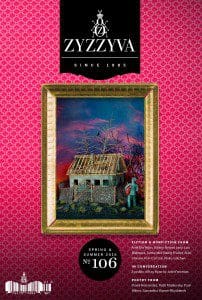American Journal: Fifty Poems for Our Time (120 pages; Graywolf) delivers on its promise of introducing readers to some of our most important contemporary American poets, both well-known and emerging. Moreover, the writers featured in it are a reflection of the diversity of the United States, which is what one would hope for in a collection curated by the current U. S. poet laureate, Tracy K. Smith. In addition to featuring a racially diverse group of writers, there are poems by old and young, female and male, and straight and gay poets (although queerness is not a theme that is […]
Tag: U.S. poet laureate
A Profile of Kay Ryan by John Freeman: ZYZZYVA No. 106, Spring/Summer
by editor
 John Freeman is the author of How to Read a Novelist (FSG), the editor of the literary journal Freeman’s, and a contributing editor to ZYZZYVA. He is also a poet whose work has been published in The New Yorker and ZYZZYVA, and is currently working on a book about American poetry.
John Freeman is the author of How to Read a Novelist (FSG), the editor of the literary journal Freeman’s, and a contributing editor to ZYZZYVA. He is also a poet whose work has been published in The New Yorker and ZYZZYVA, and is currently working on a book about American poetry.
His feature on former U.S. poet laureate and longtime Bay Area resident Kay Ryan—set at a restaurant in the Presidio on a warm San Francisco day—launches a new component of ZYZZYVA: author profiles and conversations. (In our next issue, we’ll be publishing a conversation on memoir between Andrew Foster Altschul and Geoffrey and Tobias Wolff.) The following is an excerpt from Freeman’s profile. You can read it in its entirety in Issue No. 106, which you can order here.
[…]
Upending What We Understand So as to Get to Wonder: ‘Erratic Facts’ by Kay Ryan
by Emily Luan
“The things we know / cannot be applied,” begins a poem in Kay Ryan’s new poetry collection, Erratic Facts (Grove Press, 64 pages), the first release since her Pulitzer Prize-winning book, The Best of It: New and Selected Poems. The former U.S. poet laureate returns with her signature narrow, rhyming poems to awaken and astonish us, to tilt us toward the underbelly of everyday observations. In the epilogue of Erratic Facts, Ryan notes: erratic: (n) Geol. A boulder or the like carried by glacial ice and deposited some distance form its place of origin This idea of displacement—a separation of […]
